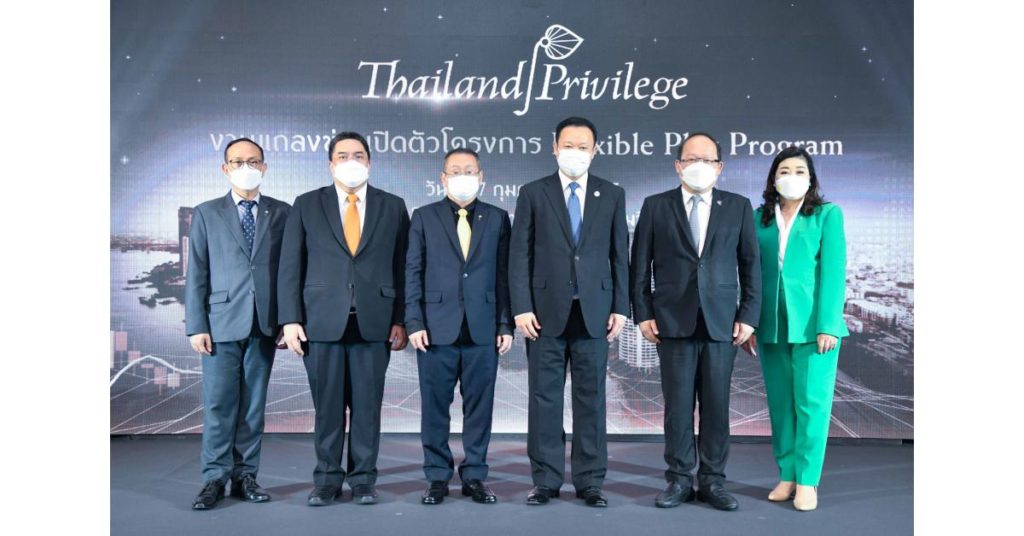
The Tourism Authority of Thailand (TAT) recently announced that the Thailand Privilege Card has launched the Flexible Plus Programme, which is positioned at affluent foreign investors and aims to help stimulate the recovery of the Thai economy.
In this press release, TAT states that The Royal Thai Government Gazette has published the announcement by the Ministry of Interior on the Flexible Plus Programme, which permits Thailand Privilege Cardholders to be granted a work permit under the Flexible Plus Programme. The Programme has been established to encourage foreign investment and to revive Thailand’s economic downturn caused by the COVID-19 pandemic.
Mr. Yuthasak Supasorn, TAT Governor and Chairman of the Board of Directors, Thailand Privilege Card, said that as of the Cabinet resolution on 19 October 2021, the investment principle on the Flexible Plus Programme has been granted approval. The Programme offers privileges for Thailand Privilege Cardholders to work under the terms and conditions, thus aiming to urge foreign investors to invest in Thailand.
“With interesting economic growth and a good investment atmosphere with high liquidity as well as convenient lifestyle and charming culture, Thailand is an attractive destination for investors to invest. The Flexible Plus Programme is enabling motivation and investment privileges for Thailand’s Privilege Card membership. With additional premium lifestyle privileges, the Programme helps stimulate foreign investment to Thailand.” Mr. Yuthasak said.
The Flexible Plus Programme is available to Thailand Privilege Cardholders with a membership validity of at least 10 years or more, and the value of the membership fee must be more than 1 million Thai Baht.
The three types of card programmes that are eligible for the “Flexible Plus Programme” are 1) Elite Ultimate Privilege (EUP), 2) Elite Superiority Extension (ESE), and 3) Elite Privilege Access (EPA).
For existing members to apply for the Programme, their membership must be valid for at least 5 years or more.
In addition, members must invest at least 1 million US Dollars within a 1-year timespan after registration or approval of their membership. The three types of investments are 1) real estate, 2) Company Limited or Public Company Limited, and 3) stock in the Stock Exchange of Thailand (other enterprises authorized by the Securities and Exchange Commission).
The Flexible Plus Programme is valid for 5 years and for members to maintain their flexible plus status, they must present proof of investment annually.
Mr. Chandhaluk Heesawat, President of Thailand Privilege Card Company Limited, said “The Thailand Privilege Card has over 16,000 members and continues to grow. The privileges for the Flexible Plus Programme members include a change in the visa type status from Privilege Entry (PE) visa to a Non-Immigrant (B) visa, which will allow cardholders to apply for a work permit. The Programme also allows legal spouses and children younger than 20 years of age (maximum 3 children) to change their visa type to a Non-Immigrant visa.”
To maintain their status, Thailand Privilege Card participants are required to report themselves and provide investment documents to the Thailand Privilege Card Company Limited every year for 5 consecutive years starting from the beginning of the investment.
The Flexible Plus Programme is being introduced through the offices of TAT and other Thai overseas government agencies in target markets around the world. Online marketing programmes and 27 sales agencies are handling the promotion in the USA and Asian nations that include China, Japan, Singapore, and Hong Kong.
The launch of the Flexible Plus Programme in European countries is planned for later in 2022.
Mr. Yuthasak concluded, “The Flexible Plus Programme is aimed at attracting foreign investors with high-purchasing power to Thailand and to help boost the economy in compliance with the government’s post-COVID economic recovery measures. In addition to the direct benefits, foreign investors and family members residing in Thailand can generate indirect benefits from their spending on tourism, accommodation, food and beverage, high-end products and services, plus more.”
